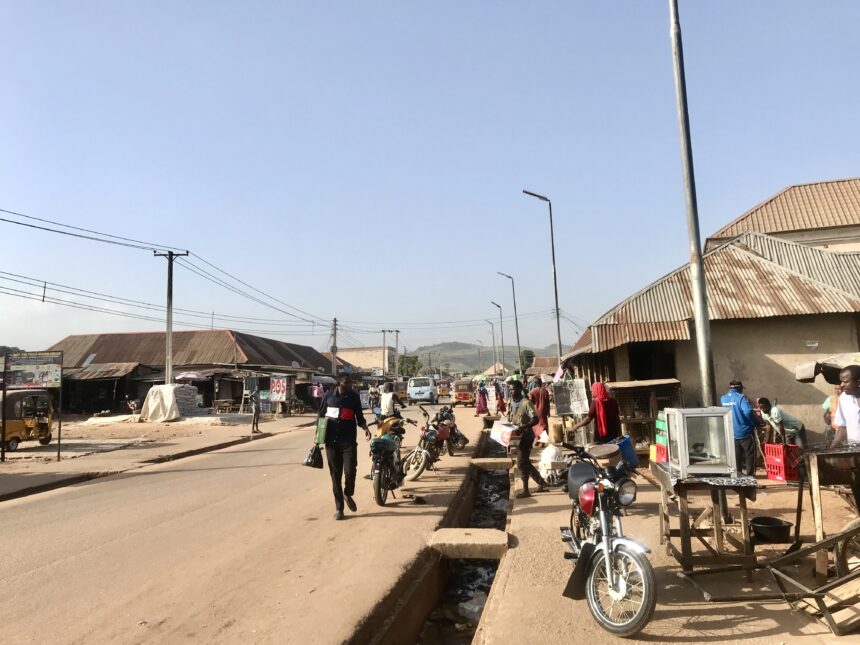It’s a cool, breezy evening, and Anthony Nnamdi sits on a bench just outside his shop. Beside him, a fellow business owner and a regular companion join him in their daily ritual of discussing the country’s economy and the state of their community.
As they observe the passers-by, Nnamdi, one hand bent under his chin, appears deep in thought. The weariness and exhaustion from the hardships he faces weigh heavily on him, and he expresses his feelings, saying:
“My shop has been burgled thrice now. I am a person struggling for survival; I get what to eat from the proceeds of my business, but as each day passes, I am forced to think that I have other forces to reckon with for that to happen smoothly, and this thought saddens me.”
Nnamdi is a small-scale business owner who sells soft drinks, wine, and other provisions. He does this business in the Karshi community, a satellite town in Abuja Municipal Area Council. The predominant tribe in this community are the Gwandaras, who constitute about 85% of the total population.
“What do we deal with? Is it the impact of the removal of fuel subsidies that has affected the average and poor Nigerians? Or the cunning and decisive means that some individuals have chosen to vindicate themselves from the situation? I ask because we are all trying our best, but the environment is gradually becoming dangerous and insecure,” he said.
Seeing the many attempts to rob his shop, Nnamdi decided to become his own security and make the shop his home. He spends the night there and starts his business every morning. He’s determined to do whatever it takes to protect his source of livelihood.
Nnamdi told Prime Progress that these were only a few of the challenges he and other community members face.
“We Thank God that we have good roads and hospitals here in Karshi, but we also have the problem of electricity. We have a very bad transformer with illegal connections, and nobody is doing anything. This has affected businesses that need light to thrive and has also brought about a shortage of water in the community,” he narrated.
Unemployment biting hard
Usman Bashir is Gwandara by tribe. Growing up in the community, he has noticed significant changes, especially in 2023. He is more concerned that people are not trying to make a positive difference in the community.

“In this place, there are so many unemployed youths who have their certificates at home. Instead of seeking ways to be productive or at least valuable in society, they prefer to gather at a specific spot, making noise about things that won’t help them in any way,” he said, pointing to Mango Shade, a regular meeting spot for youths in the community.
Bashir added that the community is not insulated from Nigeria’s unemployment crisis, and that has, in turn, posed a security problem for the community. He fears that the activities of the young people will negatively impact the younger children.
Also, Bashir added that the community seems neglected, with the government slow responding to their challenges.
“We have a major problem with electricity. It’s been weeks since we had light, and it has affected the water supply, as it cannot be pumped. We are left with the option of either buying expensive water or fetching from a well that is almost dry. It can barely serve 10 people,” he said.

Bashir also shared his dissatisfaction with the state of the environment. Despite having healthcare centres available,
“The mosquitoes in this community are too much, the drainages are always full and stinky, and everywhere is also littered. Most times, I have to pay people to clean the environment or do it myself, and that is not good for a community with a lot of residents,” he explained.
Bashir has gradually lost faith in his community. All he desires is to leave for a place with better opportunities and people willing to work together for things to improve.
“Things are hard”
Dorcas Moses, a mother of three, says that although Karshi is part of the FCT, community members seldom feel that way.
Moses, a farmer, said the lack of amenities in the community affects their quality of life.
“ I cannot explain all that I go through within a short period of time because it is too much. As a mother with children, I have to think of how I can get enough water that I can use for the entire family. Sometimes we have to buy sachet water to cook and tidy up our house because of the difficulty,” she explained.

Moses is concerned about the future of her children. She is scared that the community is not changing in favour of the residents.
“ We keep complaining about problems in this community, but no action has been taken. Karshi is an old community that should be better than this. People have come and gone, but some things just seem to remain stagnant. We need change,” Moses said.
Moses insists that the state of the country and her community, no matter how depressing it is, has not been able to take away her positivity and that she is always ready to advocate for things that will benefit her family; she also hopes the government will come to their aid in times of need.





